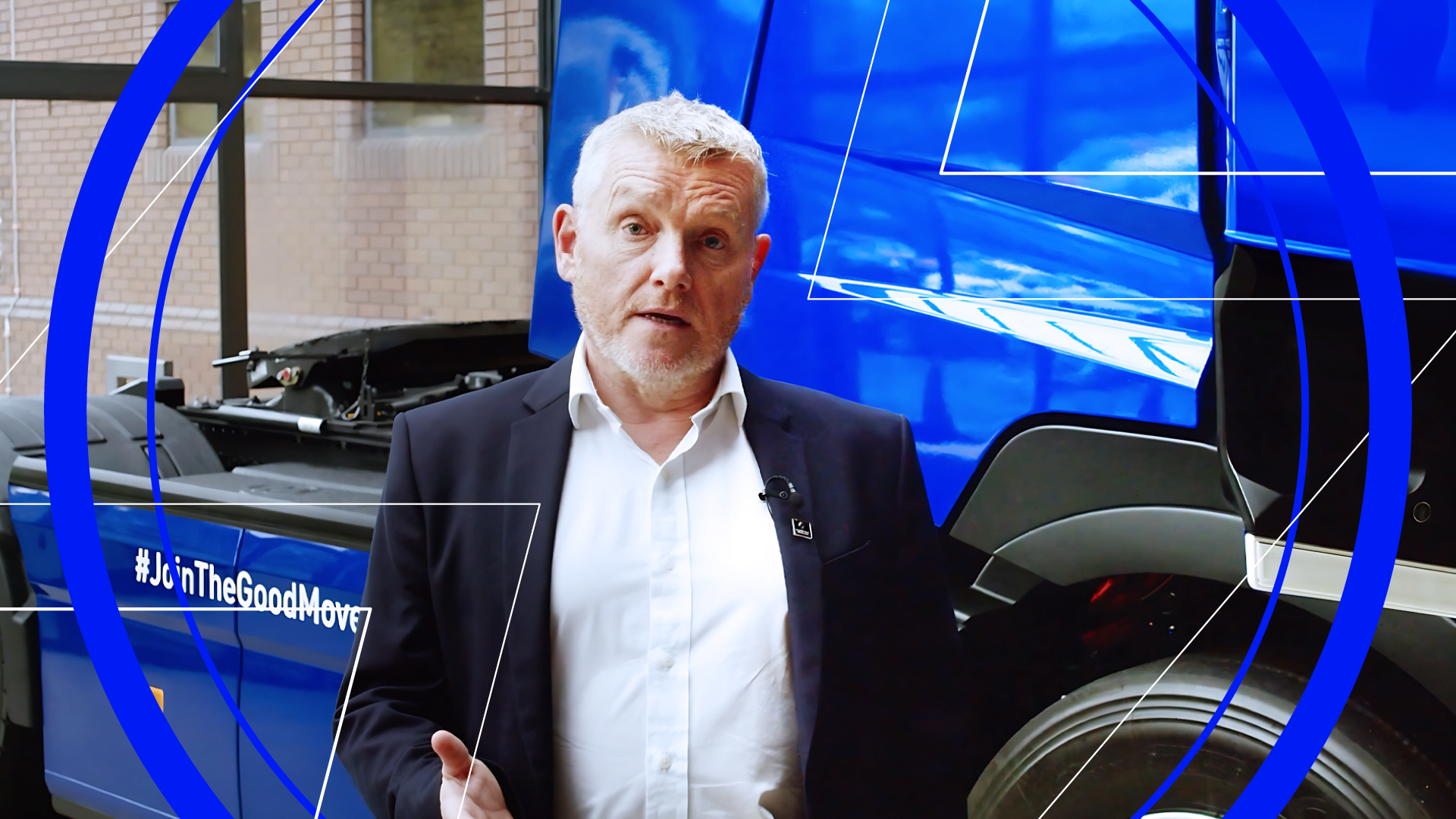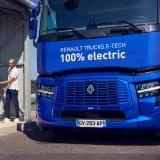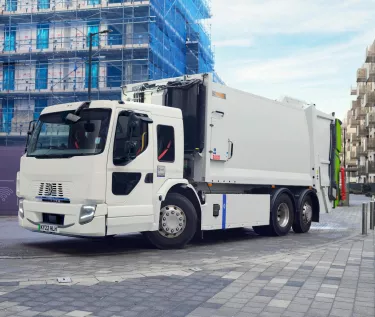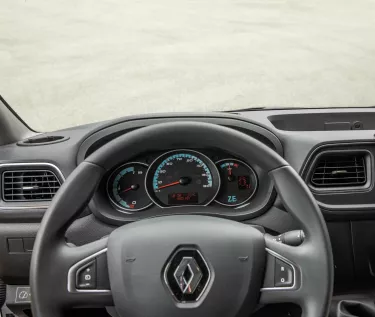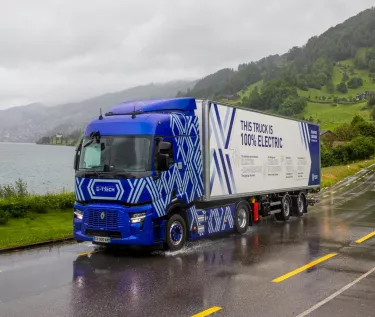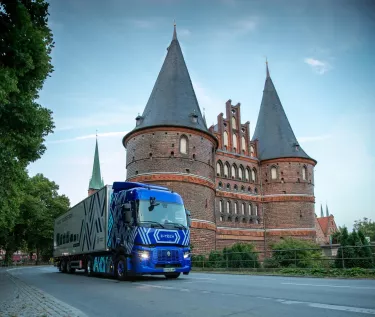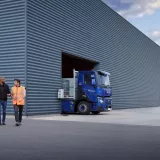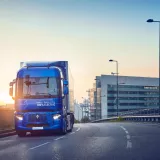Welcome to Renault Trucks UK
Electric Range
Our electric trucks
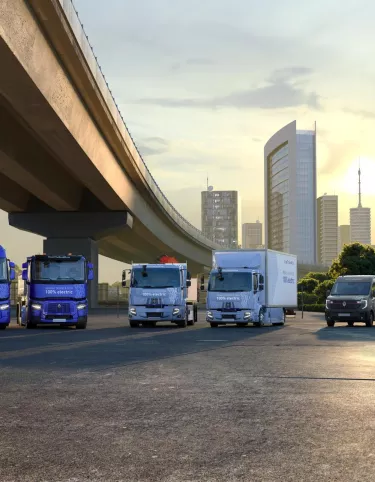
If you wish to decarbonise your fleet quickly, electromobility is the best solution to date. Renault Trucks is at your side throughout your decarbonisation plan, providing support based on experience, planning, immediacy, a calm approach and speedy execution.
To make your energy transition a success, our Energy Transition Specialists, are best-qualified to support you in your transition to electromobility.
The electric trucks that cover your needs
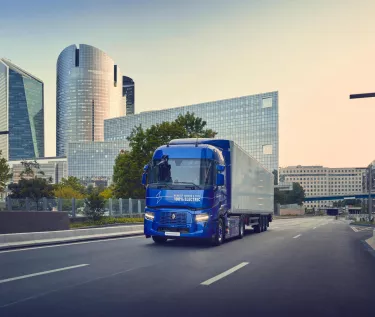
Discover the Renault Trucks E-Tech T
Your electric solution for regional distribution.
|
Operating range: Up to 500 km* |
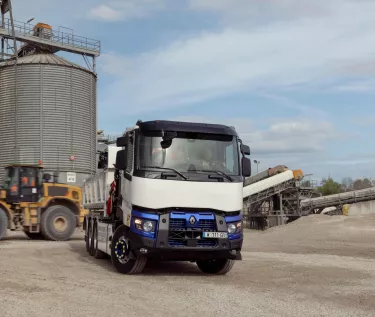
Discover the Renault Trucks E-Tech C
Your electric solution for urban construction.
|
Operating range: Up to 500 km* |
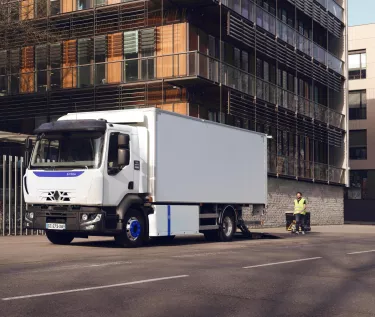
Discover the Renault Trucks E-Tech D
Your electric solution for urban logistics.
|
Operating range: Up to 560 km* |
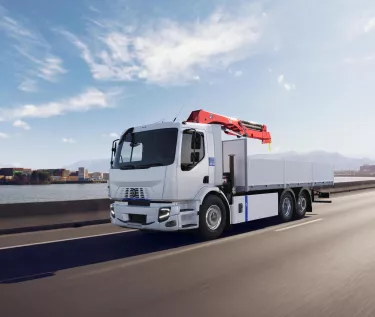
Discover the Renault Trucks E-Tech D Wide
Your electric solution for peri urban logistics.
|
Operating range: Up to 315 km* |
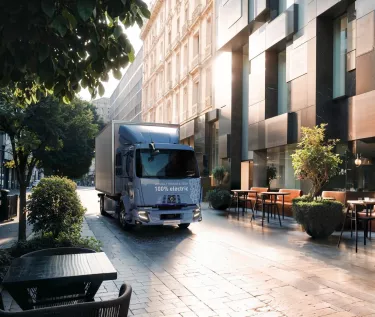
Discover the Renault Trucks E-Tech D 14t Electric
Your electric solution for inner cities.
|
Operating range: Up to 220 km* |
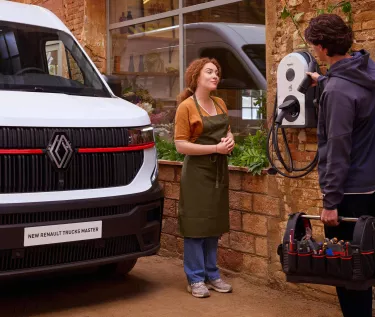
Discover the New Renault Trucks E-Tech Master
An electric van adapted to your day-to-day life.
|
Operating range: 460 km (on a single charge)* |
*Actual range may depend on several factors, such as driving speed, use of cruise control, vehicle specifications, terrain topography, driver experience, vehicle maintenance and weather conditions.
Renault Trucks Services
What is the driving range of an electric truck?
The driving range of an electric truck varies according to several factors. The application of the truck, the load being transported, the driving style and even the external conditions may have an impact on the driving range of an electric truck. With the Renault Trucks E-Tech vehicle range, the driving range may reach up to 560 km*, depending on the type of electric heavy commercial vehicle being used and the conditions of use.
*based on 6 packs of 94kWh batteries
Questions you may have on electric trucks
If you want to decarbonise your transport activity by removing diesel vehicles from your fleet, there are several solutions and energy types available to you.
To decide which solution best meets your needs, here are the steps to follow:
-
Evaluating your needs and setting objectives
-
Analysing your routes and power requirements
-
Designing the adapted solution
-
Implementing the infrastructure and trucks
Discover our dedicated support for a comfortable electromobility switch
As part of your decarbonisation journey, it’s important to conduct a site infrastructure and vehicle route analysis.
The purpose of this diagnostic check is to discuss the following questions:
-
What are your specific charging requirements?
-
Which types of electric vehicle do you think that you need?
-
Which types of charging is best suited to your operation?
-
What are the constraints of your operation?
Learn more about installation and maintenance of charging infrastructures for your electric trucks
An adapted, optimised and well-maintained infrastructure results in the enhanced performance of your electric trucks and improved return on your investment. This will be a key element in the profitability of your fleet. Electric trucks can be charged on your site if you decide to invest in the infrastructure, they can be charged at their destination or on their routes using public charging.
Learn more about installation and maintenance of charging infrastructures for your electric trucks
At Renault Trucks, we limit this impact. By keeping a track of all of batteries that we introduce to the market, we can monitor their performance in order to optimise them and keep track of their recycling process.
Learn more about environmental impact of electric truck batteries
The best electric truck is the one that perfectly matches your business needs. There is no universal answer because different operations require different capabilities. Instead of looking for the truck with the longest range or the biggest battery, it’s essential to consider your daily routes, charging infrastructure, and payload requirements.
For example, if your operations involve urban deliveries with predictable and short-distance routes, a truck with a moderate battery capacity will be the most efficient choice. On the other hand, if your business requires regional distribution with longer routes, you may need a vehicle with a higher range and fast-charging capabilities.
Ultimately, the best electric truck is the one that helps you operate efficiently, reduces your environmental impact, and integrates seamlessly into your logistics strategy. By carefully assessing your requirements, you can choose the electric truck that delivers optimal performance for your business.
Renault Trucks’ experts are specifically trained to support and guide you in making the right choice. Our consulting approach consists of several steps, including the choice of the right Renault Trucks electric truck for your business.
Discover Renault Trucks’ support in choosing the right truck.
Discover more about electromobility
Discover our range of 100% electric trucks
Renault Trucks pursues its commitment to supporting energy transition of its customers with Renault Trucks E-Tech, a range of vans and electric trucks from 3.1 to 50 tons. Manufactured in France, the different models adapt easily to any type of use and range of action.
The widespread implementation of Low Emission Zones (LEZ) are posing new challenges, and require significant changes to be made to the road haulage sector. Of the alternative energy types available today, electricity is the most effective means of decarbonising your operations in urban applications, while remaining competitive.
How does an electric truck work?
An electric truck uses an electric motor which consumes electrical energy. Batteries store the electrical energy necessary for the truck to operate, which dictates its driving range.
A battery is made up of a set of cells connected in modules, which are packaged inside the batteries. They are monitored by the battery management system (BMS). This is an electronic component that safeguards the electric truck and battery against premature ageing and fire if used inappropriately. The energy density is increased thanks to the use of Lithium-ion NMC (Nickel Manganese Cobalt) cells, which have an excellent power: weight ratio so offer the best compromise between operating range and payload.
Renault Trucks' commitments
We rely on a sustainable supply chain and conduct supply chain audits with our suppliers, including the cobalt mines themselves. The batteries are assembled in Europe. The vehicles are assembled in France.
Recycling is the responsibility of Renault Trucks once the batteries are returned to the dealer. The second life of batteries opens up multiple opportunities such as electricity storage equipment in off-grid houses and buildings or even solar plants. Recycling is also essential for guaranteeing a sustainable electromobility solution. Renault Trucks and the Volvo Group are fully involved in this area, which is developing progressively as the market is growing.
How is an electric truck recharged?
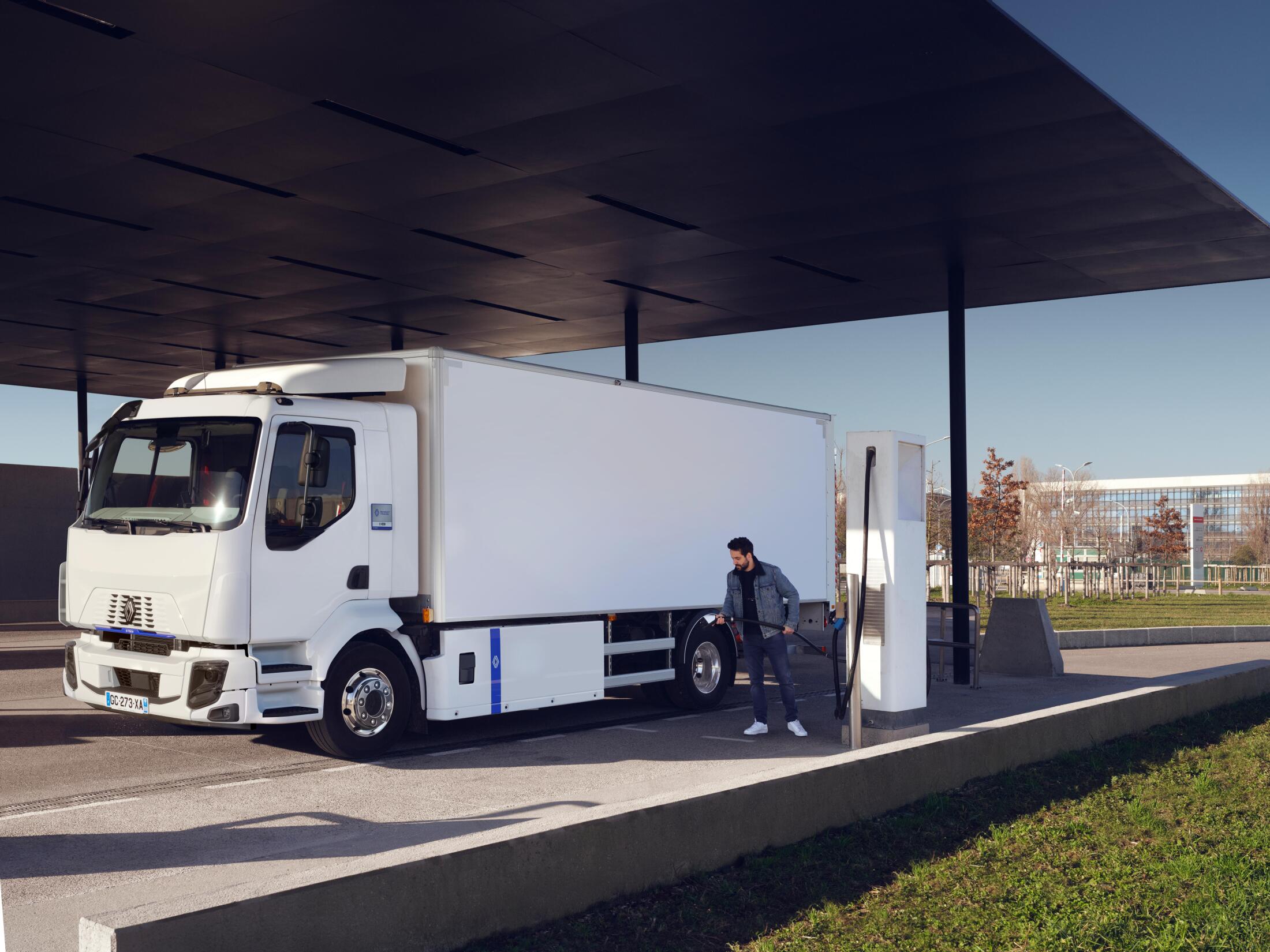
An electric truck is recharged using an adapted socket with alternating current (AC) for slow charging or using a direct current (DC) charger for rapid charging. Thanks to our innovation, Renault Trucks can offer a wide array of sustainable charging solutions, suited to your operation and your requirements. Renault Trucks charging solutions can be adapted to provide greater flexibility. We can also provide you with support in deciding upon the charging mode best suited to maintaining your profitability and advise you on how to recharge your electric trucks.
Discover how to install and maintain the charging infrastructure
How much does an electric truck cost?
Today, the capital cost of purchasing an electric truck is more than an equivalent ICE truck. However, it’s important to think of the Total Cost of Ownership (TCO) for an electric truck because when in use, the cost of an electric truck rapidly levels with that of its diesel counterpart, and even tends to continue to be more cost effective. Indeed, the maintenance costs are lower and the cost of energy is less than that of fossil fuel.
What does the future hold for trucks?
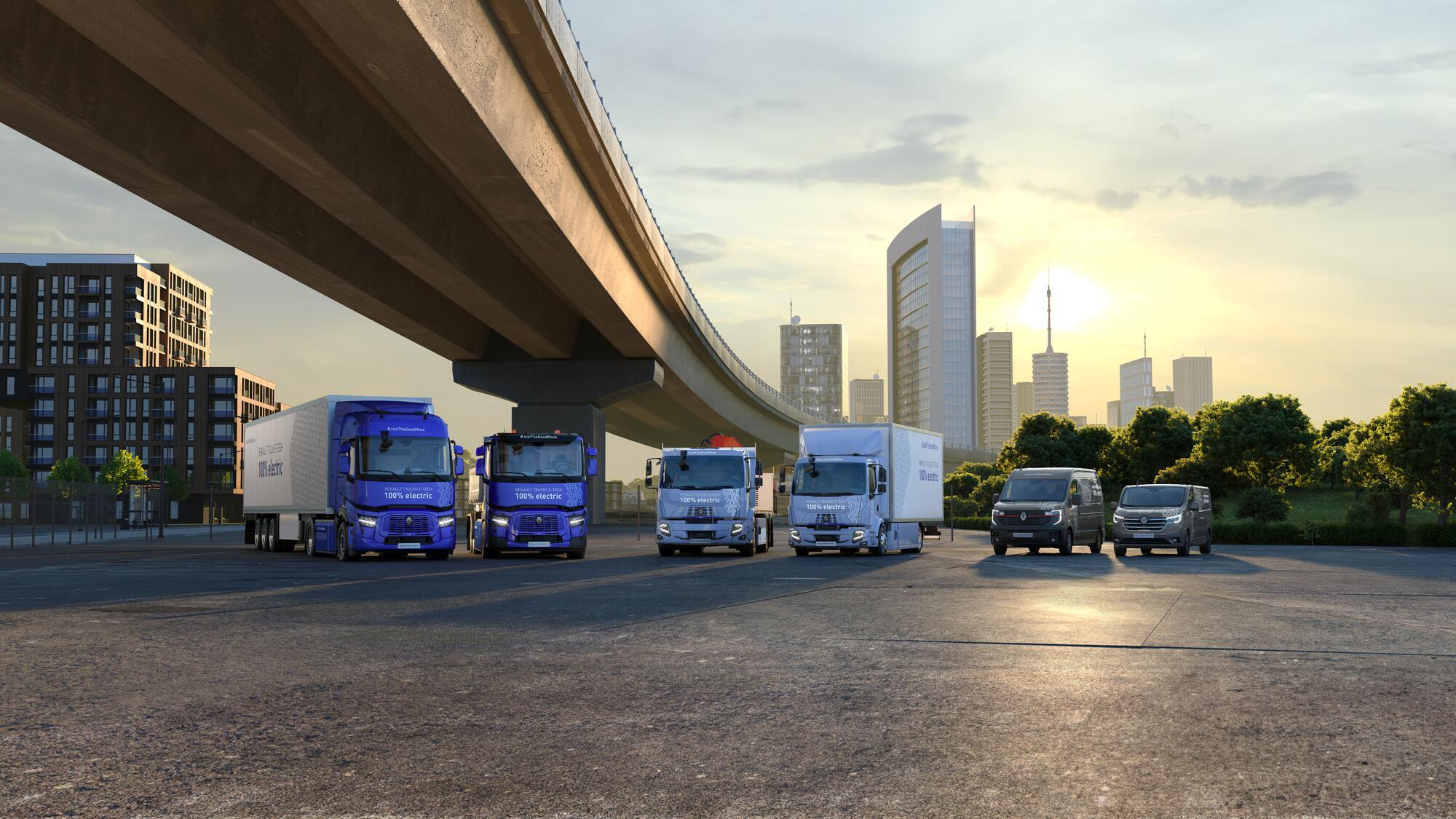
The road haulage sector must rise to the challenge of reducing CO2 emissions and meet the targets set by the climate agreements. At Renault Trucks, we are committed to energy transition and will be at your side as you decarbonise your business. We are convinced that electrical energy is the most mature solution for reducing emissions. It is for this reason that in 2023 we shall be expanding our range of 100% electric heavy commercial vehicles with the addition of Renault Trucks E-Tech C and Renault Trucks E-Tech T.
Renault Trucks Zeroing In
